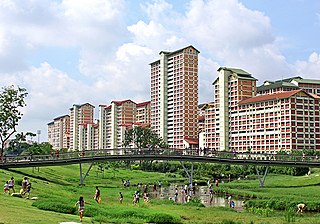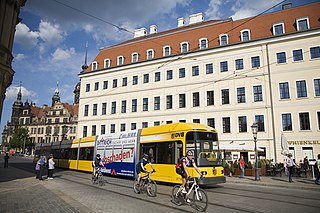Related Research Articles

Public housing is a form of housing tenure in which the property is usually owned by a government authority, either central or local. Although the common goal of public housing is to provide affordable housing, the details, terminology, definitions of poverty, and other criteria for allocation vary within different contexts. Within the OECD, social housing represents an average of 7% of national housing stock (2020), ranging from ~34% in the Netherlands to less than 1% in Colombia.

The European Structural and Investment Funds are financial tools governed by a common rulebook, set up to implement the regional policy of the European Union, as well as the structural policy pillars of the Common Agricultural Policy and the Common Fisheries Policy. They aim to reduce regional disparities in income, wealth and opportunities. Europe's poorer regions receive most of the support, but all European regions are eligible for funding under the policy's various funds and programmes. The current framework is set for a period of seven years, from 2021 to 2027.
Social exclusion or social marginalisation is the social disadvantage and relegation to the fringe of society. It is a term that has been used widely in Europe and was first used in France in the late 20th century. It is used across disciplines including education, sociology, psychology, politics and economics.
Social innovations are new social practices that aim to meet social needs in a better way than the existing solutions, resulting from - for example - working conditions, education, community development or health. These ideas are created with the goal of extending and strengthening civil society. Social innovation includes the social processes of innovation, such as open source methods and techniques and also the innovations which have a social purpose—like activism, crowdfunding, time-based currency, telehealth, cohousing, virtual volunteering, microcredit, or distance learning. There are many definitions of social innovation, however, they usually include the broad criteria about social objectives, social interaction between actors or actor diversity, social outputs, and innovativeness. Different definitions include different combinations and different number of these criteria. Transformative social innovation not only introduces new approaches to seemingly intractable problems, but is successful in changing the social institutions that created the problem in the first place.

A sustainable city, eco-city, or green city is a city designed with consideration for social, economic, environmental impact, and resilient habitat for existing populations, without compromising the ability of future generations to experience the same. The UN Sustainable Development Goal 11 defines sustainable cities as those that are dedicated to achieving green sustainability, social sustainability and economic sustainability. They are committed to doing so by enabling opportunities for all through a design focused on inclusivity as well as maintaining a sustainable economic growth. The focus will also includes minimizing required inputs of energy, water, and food, and drastically reducing waste, output of heat, air pollution – CO2, methane, and water pollution. Richard Register, a visual artist, first coined the term ecocity in his 1987 book Ecocity Berkeley: Building Cities for a Healthy Future, where he offers innovative city planning solutions that would work anywhere. Other leading figures who envisioned sustainable cities are architect Paul F Downton, who later founded the company Ecopolis Pty Ltd, as well as authors Timothy Beatley and Steffen Lehmann, who have written extensively on the subject. The field of industrial ecology is sometimes used in planning these cities.
Frank Moulaert is Professor of Spatial Planning at the Department of Architecture, Urban Design and Regional Planning at Catholic University of Leuven. He is Director of the Urban and Regional Planning Research Group and chairs the Leuven Space and Society Research Centre at the University. He is also a Visiting Professor at the School of Architecture, Planning and Landscape, Newcastle University.

Global Urban Research Unit (GURU) is a research centre established in 2002 at the School of Architecture, Planning and Landscape, Newcastle University, England.
FEANTSA, the European Federation of National Organisations working with the Homeless, is the only major European network that focuses exclusively on homelessness at European level and receives financial support from the European Commission for the implementation of its activities. FEANTSA also works closely with other EU institutions, and has consultative status at the Council of Europe and the United Nations.

The Centre for Development Studies (CDS), Thiruvananthapuram, Kerala, India is a premier Social Science research institute. It is also a higher education institution providing M.A. course in applied economics and PhD course in economics. The institute is internationally reputed for being a centre for advanced learning in economics. Its main objective is to promote research, teaching and training in disciplines relevant to development.

The Center for Policy Studies (CPS) is an academic unit within Central European University, dedicated to improving the quality of governance in Central and Eastern Europe and the former Soviet Union by the provision of independent public policy analysis and advice.

Youth exclusion is a form of social exclusion in which youth are at a social disadvantage in joining institutions and organizations in their societies. Troubled economies, lack of governmental programs, and barriers to education are examples of dysfunctions within social institutions that contribute to youth exclusion by making it more difficult for youth to transition into adulthood. European governments have recently recognized these shortcomings in societies organizational structures and have begun to re-examine policies regarding social exclusion. Many policies dealing with social exclusion are targeted at youth since this demographic of people face a transition into adulthood; defining career and lifestyle choices that will affect the future culture and structure of a society.

The United Nations University Institute on Comparative Regional Integration Studies (UNU-CRIS) is a Research and Training Institute of the United Nations University (UNU). Based in Bruges, Belgium since 2001, UNU-CRIS specializes in the comparative study of regional integration and the provision of global and regional public goods, including environmental stability, poverty reduction, peace, and justice.
TARKI Social Research Institute is an independent research centre located in Budapest, Hungary. TARKI conducts applied socioeconomic research in social stratification, labour markets, income distribution, intergenerational transfers, tax-benefit systems, consumption and lifestyle patterns and attitudes in Hungary and, in the majority of its projects, in Europe. TARKI is closely embedded in international collaborations with major European academic partners in various research projects. Senior staff at TARKI all have PhDs with substantive and methodological interests and many hold professorial appointments at major universities. TARKI has its own fieldwork apparatus, capable of carrying out regular empirical surveys on social structure and on attitudes and of managing large scale international research. TARKI also carries out the Hungarian fieldwork of various high-quality international surveys.
The sustainable urban neighbourhood (SUN) is an urban design model which is part of 21st-century urban reform theory, moving away from the typical suburban development of the UK and US towards more continental city styles. It emerged in the UK in the 1990s, specifically from pioneering work by URBED, an urban regeneration consultancy and research centre in Manchester.
Community integration, while diversely defined, is a term encompassing the full participation of all people in community life. It has specifically referred to the integration of people with disabilities into US society from the local to the national level, and for decades was a defining agenda in countries such as Great Britain. Throughout recent decades, community integration programs have been increasingly effective in improving healthcare access for people with disabilities. They have been valued for providing a "voice for the voiceless"

The Regent Park Revitalization Plan is an initiative begun in 2005 by the City of Toronto with fellow development, government, and community partners, with a focus on rebuilding the Toronto neighbourhood of Regent Park for 12,500 residents over a 15- to 20-year period. The project entails transforming what was once solely a social housing development into a self-sufficient, mixed-income, multi-use community.
Innovation districts are urban geographies of innovation where R&D strong institutions, companies, and other private actors develop integrated strategies and solutions to develop thriving innovation ecosystems–areas that attract entrepreneurs, startups, and business incubators. Unlike science parks, innovation districts are physically compact, leverage density and high levels of accessibility, and provide a “mash up” of activities including housing, office, and neighborhood-serving amenities. Districts signify the collapse back of innovation into cities and is increasingly used as a way to revitalize the economies of cities and their broader regions. As of 2019, there are more than 100 districts worldwide.

Transport divide refers to unequal access to transportation. It can result in the social exclusion of disadvantaged groups.
Loretta Lees is a university professor, urbanist, author, and scholar-activist. She is the Director of the Initiative on Cities and professor of sociology at Boston University. Prior to moving to Boston, she was Professor of Human Geography at the University of Leicester in the UK and served as Chair of the London Housing Panel working with the Mayor of London and Trust for London. Since 2009, she has co-organized The Urban Salon, a London forum and seminar series for architecture, cities, and international urbanism, which examines urban experiences using an international and comparative frame. Lees’ scholarship focuses on gentrification, urban regeneration, global urbanism, urban policy, urban public space, architecture, and urban social theory. She was identified as the only woman in the top 20 most referenced authors in urban geography worldwide and the top author on gentrification globally. She was awarded the 2022 Marilyn J. Gittell Activist Scholar Award from the Urban Affairs Association. Other accolades of Lees include her election as a fellow of Academia Europaea (MAE) in 2022, and Academy of Social Sciences (FAcSS) in 2013. She has published 16 books and over 100 journal articles and book chapters. Her research has been featured extensively in documentaries, newspapers, and in podcasts.
References
- ↑ Cameron, S. and Coaffee, J. (2005) 'Art, Regeneration and Gentrification: From artist as pioneer to public arts', International Journal of Housing Policy, 5(1), pp.41–60.
- 1 2 "Stuart Cameron". Katarsis. Retrieved 6 April 2024.